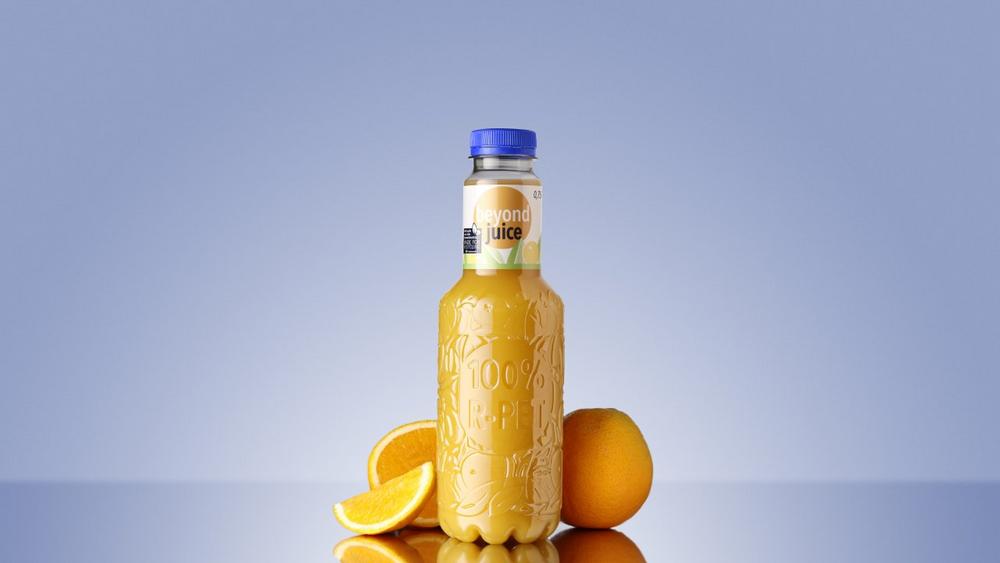“With Beyond Juice we’re providing concrete answers to the challenges of the beverage industry, taking the juice bottle as an example. Also in view of the current debate on plastics practical, environmentally-friendly systems are becoming more and more important," says Philipp Langhammer, product manager for barrier technology at KHS Corpoplast. What is needed is an integral and sustainable type of packaging suitable for the entire spectrum of sensitive beverages. “When developing the bottle we thus strictly adhered to our credo of environmental protection, recyclability and maximum product protection,” states Langhammer. The PET container was designed by the KHS experts from the holistic Bottles & ShapesTM consultancy program together with environmental service provider Interseroh from Cologne according to their latest design guidelines.
Environmental service provider issues recycling seal
Following a number of optimizations the Beyond Juice bottle was issued with the Made for Recycling seal by Interseroh – the first PET bottle to score a full 20 out of 20 points. “Thanks to the seal on the label, for the first time consumers can now allow the bottle’s truly excellent recycling properties to help influence their decision to buy when standing in front of the supermarket shelf,” says packaging engineer Julian Thielen from Interseroh. “In the medium term, for packaging the criterion of recyclability will additionally become just as important as the aspects of product protection, convenience and attractiveness – also on an international scale.”
Unique product protection
The Beyond Juice bottle satisfies all of these criteria – among other things with the help of FreshSafe PET®. “We were only able to give top marks when analyzing the bottle’s recyclability because KHS SiOx barrier technology was used,” Thielen explains. “Alternative composite materials utilized as a barrier also often color the recyclate and yield an inferior quality.” Beyond Juice does not apply these otherwise usual composite materials which are added to the bottle material to protect the product and make pure-grade recycling much more difficult or even impossible. This topic is quickly gaining in significance on an international scale, too. This is illustrated, for example, by the plastics strategy presented by the EU Commission at the start of 2018 which aspires to make all packaging waste in Europe recyclable by 2030.
FreshSafe PET® also ensures that sensitive, high-quality juices and spritzers, for instance, keep up to ten times longer than those filled into uncoated bottles. This is primarily thanks to the wafer-thin layer of glass applied to the inside of the bottle which prevents oxygen from penetrating the bottle and CO2 from escaping from it.
Trouble-free recycling of the entire bottle
The label area on the Beyond Juice container has been kept so small that sorting systems recognize it as a PET bottle. This makes sure that the container can be reintroduced to the recycling loop and is not simply used to make energy. It was also important to select the right kind of adhesive so that the label can be separated from the plastic in the recycling process and there is no unintentional soiling during the washing process.
The new KHS bottle concept has also been developed as a film-free pack for recycling purposes. Dots of adhesive which are strong and secure yet easy to remove hold the bottles together. With Nature MultiPackTM from KHS the film otherwise used to package the PET bottles as a six-pack, for example, is no longer required. This adhesive is also easily removed during recycling. “By doing away with the secondary film around the pack we’re helping to further reduce this type of packaging waste by up to 90%,” Langhammer claims.
As the Beyond Juice bottle consists of 100% rPET, it significantly helps to reduce the carbon footprint left by packaging throughout its entire life cycle. New studies by recognized trade associations confirm that PET bottles made of 100% recyclate have a much lower carbon footprint than containers made of what is known as virgin PET. Langhammer concludes that “at a production of 50 million bottles a year more than 1,500 metric tons of raw material in the form of new PET could be saved by our bottle.”
KHS GmbH is one of the leading manufacturers of filling and packaging systems for the beverage, food and non-food industries. The KHS Group includes the following companies: KHS GmbH, KHS Corpoplast GmbH, and numerous subsidiaries outside Germany, located in Ahmedabad (India), Sarasota and Waukesha (USA), Zinacantepec (Mexico), São Paulo (Brazil) and Suzhou (China).
KHS GmbH manufactures modern filling and packaging systems for the high-capacity range at its headquarters in Dortmund, Germany, and at its factories in Bad Kreuznach, Kleve and Worms. The group’s PET expertise is pooled at KHS Corpoplast GmbH in Hamburg, Germany, where innovative PET packaging and coating systems are developed and produced. KHS is a wholly owned subsidiary of the SDAX-listed Salzgitter AG corporation. In 2018 the KHS Group and its 5,081 employees achieved a turnover of around €1.161 billion.
KHS GmbH
Juchostr. 20
44143 Dortmund
Telefon: +49 (231) 569-0
Telefax: +49 (231) 569-1541
http://www.khs.com
Presse- und Öffentlichkeitsarbeit
Telefon: +49 (251) 625561-243
E-Mail: deppe@sputnik-agentur.de
![]()

